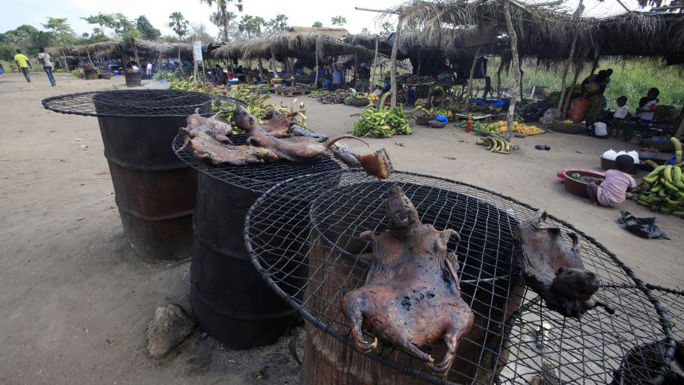Bushmeat Street Food in a Market
Photo: Bushmeat - from bats to antelopes and monkeys - has long been on family menus in West and Central Africa. Experts who have studied the Ebola virus say its suspected origin is forest bats. Links have also been made to the carcasses of freshly slaughtered animals consumed as bushmeat.
The drama surrounding the Ebola outbreak occurring in Guinea and Liberia has health officials worried – and it should. These West African nations are under siege, battling an enemy you can’t see, that kills most people it touches. The enemy is Ebola, one of several varieties of hemorrhagic fever.
Even after decades of studying the disease, health officials still don’t know where it originated, though they are certain that it is zoonotic – a form of disease that spreads from animals to humans. Other types of zoonotic hemorrhagic fevers include Rift Valley fever, Marburg virus, Lhasa fever and Crimean-Congo fevers. In addition to being zoonotic diseases, these infections have another thing in common: they kill.
Zoonotic diseases are common and can be caused by viruses, bacteria, fungus, parasites and other agents, according to the U.S. Centers for Disease Control and Prevention (CDC). Influenza, or flu, is one example of a zoonotic disease. You can blame the flu largely on ducks, though pigs and other birds can also host the virus.
Animals make ideal hosts for these viruses and most do not get sick from the viruses they carry. But health officials worldwide worry every year that new, mutant strains of zoonotic diseases may cause a global pandemic, wiping out millions of people, like the 1918 Spanish flu, which killed between 50 and 100 million.
Eastern Equine encephalitis, yet another zoonotic disease, derives from horses. While horses host the disease, it is spread by mosquitoes that transmit the disease from animals to humans. Approximately 33 percent of those who become infected with the disease die, and many survivors remain brain-damaged. Lyme disease, hosted by mice and spread through ticks carried by mice and deer, is now a scourge infecting an unknown number of people.
Then there is hantavirus, named after the Hantan River in Korea, where the disease was first detected. Humans can get this virus from contact with rodent excrement, though the deer mice that carry the disease do not suffer any symptoms.
As the human population increases, more natural habitats will be disrupted, potentially unleashing various contagious diseases that have lived undisturbed for millennia. Population density and other factors play into how outbreaks occur, and how long they last. Even the Great Plague eventually died out. But that was after the disease, which traveled along the Silk Road from northern Asia, had wiped out as many as 200 million people. Carried by fleas, the plague has flared up periodically throughout history, but fortunately has never been as devastating as the outbreak of the 1300s.
The fashionable habit of eating exotic meats also has health agents concerned, as previously un-eaten or rare species can carry strains of bacteria and viruses that can be dangerous or lethal to humans. The 2002 outbreak of the SARS virus may have derived from the consumption of wild civets – a nocturnal mammal native to Africa and Asia. Approximately 8,000 people were infected with SARS, possibly thanks to that culinary experiment, and 774 died.
Even conventional meat eating can go wrong, as in the case of Creutzfeldt-Jakob disease, a form of spongiform encephalopathy derived from cattle. The disease turns human brains into something akin to Swiss cheese. Large-scale breeding of livestock can cause rapid distribution of pathogens, spreading throughout animals due to crowding and exposure to blood and feces. Eventually, infected animals can infect us.
There is nothing theoretical about the hazards of an exploding human population, encroachment upon wild ecosystems, the eating of so-called exotic meats and intensive factory-farming of livestock as causes for the eruption of new, fatal diseases. Engaging in proper methods of sanitation and hygiene can help, especially regarding contact with feces from other species. A vegetarian diet can eliminate a great deal of the risk of contracting zoonotic diseases as well.
There are no simple solutions to this problem. All it takes is on Ebola-infected person to board a commercial jet and infect others, who then go off to their homes, offices, schools, and churches – where they could potentially infect millions.


